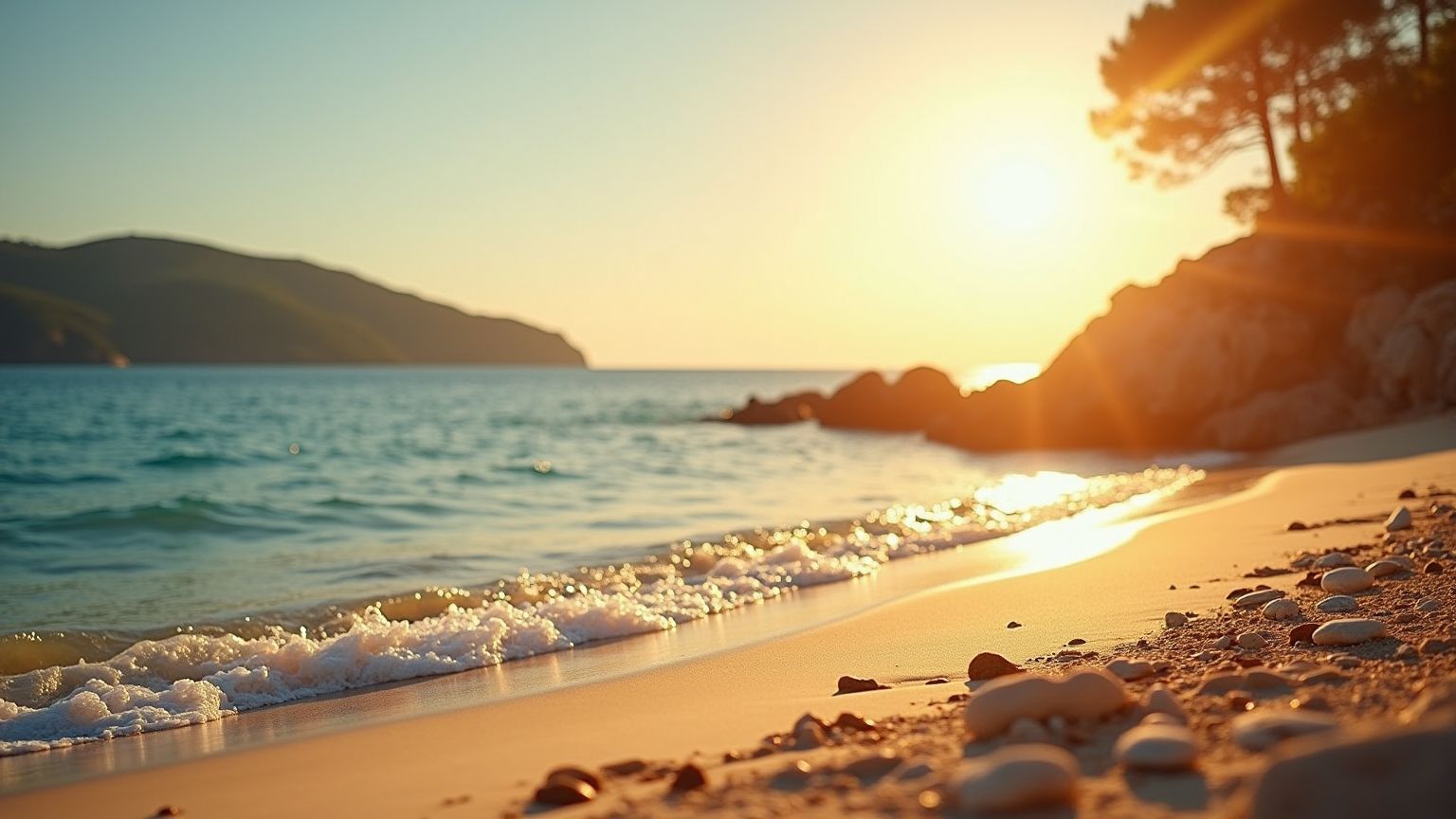The Best Time to Visit Greece: A Deep Dive from Someone Who Knows the Land
I've spent over 15 years guiding wide-eyed travelers through the sun-drenched landscapes of Greece, watching them gasp at their first glimpse of the Acropolis or dip their toes in the impossibly blue Aegean. But I've also witnessed the crushing disappointment when unexpected rain washes out a boat tour or when throngs of tourists make Santorini feel more like Times Square than a Mediterranean paradise.
Let me be straight with you – there isn't one magical "best time to visit Greece" that works for everyone. This country transforms dramatically with each season, offering entirely different experiences depending on when you arrive.
Whether you're dreaming of getting lost in whitewashed island alleys, standing where ancient philosophers once debated, or simply devouring a perfect souvlaki while watching fishing boats bob in a harbor, I'm about to help you nail down when to book those tickets.
Greece Through the Seasons: What the Travel Guides Don't Tell You
Having watched Greece change its colors through countless cycles of seasons, I've developed a sixth sense about how each month unveils different treasures across this diverse country. The best time to visit Greece depends entirely on what you're seeking.
Spring in Greece: March Through May (The Insider's Secret)
Spring might just be Greece's best-kept secret. The countryside erupts in a riot of wildflowers, painting ancient ruins with splashes of red poppies and yellow daisies that most summer visitors never imagine.
The Weather Reality: March flirts with winter, hovering around 55-65°F (13-18°C) with occasional moody rain showers. By May, you're basking in delicious 70-75°F (21-24°C) sunshine that's perfect for exploration without the summer sweat.
Why spring might be your best time to visit Greece:
- Archaeological sites practically to yourself (imagine having Delphi without jostling elbows!)
- Prices that won't make your wallet weep (except during Easter week)
- Locals who aren't yet exhausted by tourist season and genuinely want to chat
- Landscapes bursting with life and color instead of summer's golden-brown
- The sweet satisfaction of exploring while others are still planning their summer trips
The not-so-perfect parts:
- Island infrastructure waking up slowly (some tavernas and shops don't open until April)
- Sea temperatures that might make you gasp (though brave souls swim by late May)
- Less frequent ferry connections between islands
- The occasional spring shower interrupting your plans
My favorite spring adventures:
- Watching the Acropolis marble glow in the gentle spring light without summer's crushing crowds
- Hiking ancient paths between olive groves with perfect 65°F temperatures
- Joining a local family for the midnight Easter celebrations (the candles, the feast, the traditions!)
- Getting deliberately lost in villages where spring traditions continue unchanged for generations
Summer in Greece: June Through August (The Classic Experience)

This is the Greece of postcards – endless sunshine, midnight swims, and taverna tables spilling onto beaches. But the quintessential Greek summer comes with trade-offs that the best time to visit Greece discussions often gloss over.
The Unfiltered Weather Truth: Hot. Really hot. Mainland temperatures regularly hit 85-95°F (29-35°C), sometimes pushing past 100°F (38°C). The islands get relief from the "meltemi" winds, which can be either refreshing or annoying depending on their strength.
Why summer might be your best time to visit Greece:
- That perfect beach day you've been dreaming about (warm water, hot sand, cold drinks)
- Sunrise at 6am, sunset after 9pm = maximum exploration time
- Every single restaurant, bar, and attraction running at full tilt
- Island-hopping made easy with frequent ferries
- Energy that crackles through beach parties and night markets
The reality checks:
- Prices that can double or triple from shoulder seasons
- Santorini sunsets with hundreds of your closest stranger-friends
- Archaeological explorations that become endurance tests in midday heat
- The need to book everything (and I mean everything) well in advance
- A sometimes artificial experience as locals shift into "tourist season mode"
Summer magic you shouldn't miss:
- Island-hopping through the lesser-known Cyclades (skip Mykonos, try Milos or Folegandros)
- Ancient theater performances under actual stars at Epidaurus or Odeon of Herodes Atticus
- Village "panigiria" celebrations where everyone dances until dawn
- Midnight swims in bioluminescent waters (ask locals for the best spots)
Autumn in Greece: September Through November (The Sweet Spot)
After fifteen years of guiding visitors, I'd personally put early autumn at the top of my "best time to visit Greece" list. September and early October deliver summer's warmth without its frenzied pace – a perfect balance that feels like Greece exhaling.
The Weather Whispers: September feels like summer's gentle goodbye – 75-85°F (24-29°C) days perfect for everything. By November, you're looking at cooler 60-70°F (15-21°C) temperatures and increasing chances of rain, especially in western Greece.
Why autumn might be your best time to visit Greece:
- The divine combination of warm days without summer's scorching heat
- Dramatically fewer tourists after mid-September (local's sigh of relief is almost audible)
- Sea temperatures still perfect for swimming through October
- Prices that drop as dramatically as the tourist numbers
- Harvest festivals that connect you to the land's ancient rhythms
- That magical golden light photographers chase across the world
A few considerations:
- Island businesses starting to close by late October
- Ferry schedules thinning out after the summer rush
- Increasing weather unpredictability by November
- Some attractions reducing their opening hours
Autumn experiences that define the best time to visit Greece:
- Winery visits during harvest in Macedonia, Nemea, or Santorini
- Joining local families for olive harvesting in the Peloponnese
- Hiking ancient paths with comfortable temperatures and clear air
- Capturing photos in that extraordinary Greek autumn light that turns ordinary scenes magical
- Having entire beaches to yourself by mid-October
Winter in Greece: December Through February (The Authentic Immersion)
Winter reveals a Greece that tourists rarely witness – a living, breathing country with rich traditions that have nothing to do with entertaining visitors. This hidden season might just be the best time to visit Greece for those seeking genuine cultural immersion.
The Real Winter Picture: Milder than northern Europe, with Athens hovering around 50-55°F (10-13°C). Mountain areas transform with significant snowfall, while islands remain milder but can experience moody storms and winds.
Why winter could surprisingly be your best time to visit Greece:
- Prices that plummet to local-friendly levels
- Archaeological wonders like the Acropolis or Delphi all to yourself
- Windows into authentic celebrations and traditions
- Cozy evenings in Athens' vibrant café culture
- Skiing the slopes of Mount Parnassus by morning, exploring ancient Delphi by afternoon
The winter realities:
- Many island businesses shutter completely
- Dramatically reduced ferry services
- More frequent rainfall, especially on the western side
- Shorter days limiting exploration time
- Swimming becoming a polar bear activity
Winter magic most tourists miss:
- Athens wrapped in Christmas lights without the tourist crush
- Stone-built mountain villages with roaring fireplaces and local spirits
- Skiing or snowboarding at surprisingly affordable Greek resorts
- Winter-only Greek dishes that rarely appear on summer menus
- The December 24th tradition of karavákia (small decorated boats) instead of Christmas trees in maritime regions
The Peloponnese: Greece's Year-Round Treasure Chest
Let me share something personal – after showing visitors around every corner of Greece, the Peloponnese peninsula remains my heart's favorite. This often-overlooked region packs enough diversity to be its own country, offering the best time to visit Greece no matter when you arrive.
What Makes the Peloponnese Special?
Having guided countless groups through this magnificent peninsula, I've watched visitors fall under its spell for countless reasons:
- Accessibility: Just an hour from Athens yet worlds away from tourist circuits
- Incredible variety: Snow-capped mountains, pristine beaches, ancient ruins, and medieval castles all within short drives
- Authentic immersion: Villages where traditions continue uninterrupted by mass tourism
- Value: Your euro stretches significantly further than on the islands
- Year-round appeal: Each season unveils completely different experiences
The Peloponnese Through the Seasons
Spring: The Peloponnese Awakens (March-May)
Spring in the Peloponnese might just represent the perfect best time to visit Greece for those seeking balance between good weather and authentic experiences.
Nafplio & Eastern Treasures (March-May)
- Base yourself in Nafplio – a seaside town so charming it feels almost unreal
- Explore Mycenae with ancient walls blooming with wildflowers
- Hike the ancient paths connecting villages when temperatures hover perfectly around 65°F
- Witness Greek Easter celebrations in towns where traditions remain untouched by tourism
- Watch fishing boats return to harbor as you dine along the promenade without summer crowds
Ancient Olympia (April-May)
- Stand where Olympic athletes competed 2,800 years ago, surrounded by spring greenery
- Photograph temple ruins in perfect light without tour groups photobombing
- Visit family wineries where they're bottling last year's vintage
- Stumble upon village spring festivals celebrating agricultural traditions most tourists never see
Summer: Peloponnesian Pleasures Without the Crush (June-August)
While summer represents peak season throughout Greece, the Peloponnese offers one of the best times to visit Greece for those who want summer vibes without summer crowds.
Messinian Coast Magic (June-August)
- Discover beaches that would be world-famous if they were on Mykonos
- Visit Costa Navarino where luxury and authenticity somehow perfectly blend
- Combine morning ancient site visits with afternoon beach relaxation
- Feast on fresh catches in fishing villages where prices remain reasonable
- Take boat trips to hidden coves inaccessible by land
The Mysterious Mani (July-September)
- Explore Greece's most distinctive region with its stone tower houses and rugged beauty
- Stay in boutique hotels crafted from centuries-old buildings
- Swim in water so clear it seems photoshopped at beaches like Foneas
- Hike the spectacular Viros Gorge before the day's heat arrives
- Dance with locals at village festivals that few foreign visitors ever witness
Autumn: Peloponnesian Perfection (September-November)
Many locals would tell you that autumn represents the absolute best time to visit Greece, particularly the Peloponnese where harvest activities create a feast for all senses.
Nemea Wine Country (September-October)
- Join the grape harvest at family wineries producing world-class Agiorgitiko reds
- Tour vineyards with the actual winemakers, not rehearsed guides
- Explore ancient Corinth when golden light makes the marble columns glow
- Feast on seasonal game dishes paired with new wines
- Photograph mountains and vineyards as they transform with autumn colors
Arcadian Mountain Villages (October-November)
- Wander through stone-built villages like Dimitsana when fall colors frame their beauty
- Hike forest paths carpeted with autumn leaves
- Visit cliff-hanging monasteries in the Lousios Gorge when tourist buses have disappeared
- Warm your hands around cups of mountain tea in village squares
- Experience authentic chestnut festivals that connect to ancient harvest traditions
Winter: The Secret Peloponnese (December-February)
Winter reveals what might be the most authentic best time to visit Greece for cultural immersion, particularly in the Peloponnese mountains.
Kalavryta Winter Wonderland (December-February)
- Ski affordable slopes at Kalavryta where a full-day pass costs less than lunch at European resorts
- Ride the historic cog railway through snow-dusted gorges
- Learn about critical WWII history at the solemn Holocaust Museum
- Warm up with rakomelo (honey-spiced raki) by roaring fireplaces
- Experience Christmas traditions that pre-date tourism by centuries
Byzantine Laconia (January-February)
- Explore the Byzantine city of Mystras against a backdrop of snow-capped Taygetus mountains
- Watch (or join) traditional olive harvesting with methods passed through generations
- Visit Sparta when you can truly appreciate how those warriors handled winter
- Feast on heartwarming winter specialties like roast pork with quince or fasolada bean soup
- Stay in boutique hotels at literally half the summer prices
Finding Your Perfect Greek Moment: Personalized Recommendations
After customizing countless itineraries, I've learned that the best time to visit Greece depends entirely on what experiences you're seeking. Here's my personal advice based on traveler types:
For Beach Devotees & Island-Hoppers
- Prime Time: Late May through early October
- The Sweet Spot: September (warm seas, fewer people, better service)
- Insider Tip: Skip the obvious islands. The best beaches are often on islands you haven't seen on Instagram.
For History & Archaeology Buffs
- Prime Time: April-May or September-October
- The Sweet Spot: Early May (wildflowers among ruins, perfect temperatures)
- Insider Tip: The most moving sites are often the lesser-known ones – Ancient Messene over crowded Epidaurus, Dion instead of packed Delphi.
For Cultural Immersion Seekers
- Prime Time: The off-season (November-April)
- The Sweet Spot: Around Orthodox Easter for once-in-a-lifetime celebrations
- Insider Tip: Stay in one region long enough to break through the tourist/local barrier – magic happens around day five.
For Food & Wine Lovers
- Prime Time: Harvest season (September-November)
- The Sweet Spot: October (when everything from grapes to olives is being harvested)
- Insider Tip: Follow specific harvest festivals rather than generic food events.
For Hiking & Outdoor Enthusiasts
- Prime Time: April-June or September-October
- The Sweet Spot: Early October (stable weather, moderate temperatures)
- Insider Tip: The Peloponnese offers Greece's most diverse hiking, from coastal paths to alpine trails.
Beyond Finding the "Best Time to Visit Greece"
After fifteen years of showing travelers this extraordinary country, I've realized something important: there's no perfect or best time to visit Greece – there's only the perfect time for YOUR Greece.
The Greece I've come to love isn't just a collection of ruins and beaches. It's the Greece where three generations still gather for Sunday lunch, where passionate debates erupt in village squares, where traditions dating back to ancient times still shape daily life.
Whether you choose spring's wildflower carpets in the Peloponnese, autumn's golden light in the vineyards, summer's midnight swims in the Aegean, or winter's cozy taverna evenings in mountain villages, the best time to visit Greece is whenever you can open yourself to its rhythms.
The perfect Greek moment might be a simple coffee shared with a local, a sunset that silences everyone on a hillside, or the taste of a tomato still warm from the garden. These moments exist in every season if you know where to look.
Kalo taxidi, friends – may your journey be as magical as this ancient land deserves.








